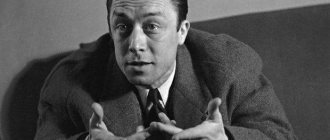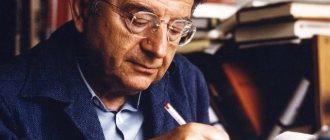They often say about such people: “a jack of all trades.” Agree, each of us has at least one acquaintance (acquaintance) who has involved himself in almost all areas of activity. He works, sculpts, writes poetry, sings, and even manages to do everything at home. Such people simply amaze and never cease to amaze, in which case you involuntarily think about whether a talented person is really talented in everything?
Phenomenon of talent
Talent is a person’s ability to develop a certain skill that is given by nature. It should be noted that it can manifest itself at different ages. A talent for drawing, mathematics or technology usually makes itself felt in early childhood. But abilities for scientific activity, literature or politics are revealed at a more mature age.
At the same time, if you don’t develop your talent and don’t put any effort into it, then even the greatest gift will fade away over time. Ability without hard work is worthless, it is only hope, an open door that can only be entered through hard work. Therefore, the expression “a talented person is talented in everything” is only half true.
How to raise a genius
Genius is not inherited. It is impossible to predict the birth of a genius, but it is known that geniuses are more common among boys. Genius parents can give birth to an ordinary child and vice versa. By the way, 1 genius is born per million of average and talented people. Therefore, before asking “How to raise a genius?”, you need to determine whether your child is a genius. If not, then there is no need to “rape” him or force him. Otherwise, sooner or later it will not withstand your pressure and will “explode.”
We have prepared 8 recommendations for parents who want to raise a genius or simply a talented child:
- Encourage your child's independence, curiosity and activity.
- Play with your child as much as possible. Games also develop activity and curiosity.
- Develop your child’s vocabulary and horizons. First, read books to him yourself, and then teach him to read and encourage him to do so.
- Communicate with your child as much as possible, involve him in the conversation with questions. Communication promotes intellectual, emotional and linguistic development. Talk to your child as an equal interlocutor, ask for his opinion.
- Enroll your child in a music club. This is necessary not only for the development of musical abilities, but also for general development, for the development of memory.
- Encourage your child to create with their hands. This is useful for the development of fine motor skills, creativity, and imagination.
- Explain the world around the child, attract his attention to interesting things, explain, show, tell.
- Lead by example. Be active, creative, positive, purposeful, unique.
Five interesting and useful activities for children:
- Invite your child to climb trees. This entertainment, which parents usually do not like, trains self-control. The child learns to fight fears, pacify emotions, think analytically and outside the box (how best to get to the top). Having practiced in the trees, the child will not give in to life's difficulties.
- Offer your child a certain amount or other bonus for learning to juggle. This activity develops coordination, attention, determination, and patience. In addition, psychologists have found that after 6 weeks of juggling, the volume of white matter responsible for learning increases by 5%.
- Teach your child to play chess. This will teach him to tolerate defeat, learn from mistakes, and think strategically. In addition, chess develops perseverance, attention, and perseverance. The child will learn to make decisions and take responsibility for them.
- Praise actions, not victories. This is necessary for the development of self-confidence and adequate self-esteem. If you praise your child's actions, he will learn to appreciate them himself. And he will also understand that sometimes success depends not only on a person’s actions, but also on external circumstances.
- Reward for victories and achievements. This builds patience, willpower, and perseverance. The child must understand that the blessings of life are not given just like that.
Consider your child's interests and abilities. Don't force him to do everything or anything you find useful. Don't focus on the idea of raising a genius. Focus on raising a happy, individual child.
To become a genius, or simply a talented person, you need to be a unique person.
Work on yourself
One famous philosopher said that even if a person is not very talented in something, but he works hard on himself, he will certainly achieve success. For example, outstanding writers say that the key to their success is not only talent, but, first of all, perseverance and high efficiency. Great achievements can be achieved not just by talented individuals, but by plowmen with a gift. For example, Mike Tyson became a world champion not only because he had natural abilities. He trained every day from dawn to night. His coach kept a tight rein on him the whole time. But as soon as Mike left his mentor, he immediately began to ignore everyday classes. As a result of this, Tyson very quickly lost his talent.
Believe in yourself
Talented people, as a rule, have been achieving success for more than one year. To truly become a master of your craft or several occupations at the same time, you must:
- set a specific goal;
- not to be afraid of obstacles;
- have a lot of faith in yourself.
These points usually work flawlessly in any endeavor. Quite often we want to learn something: drive a car, embroider, dance, learn English, but at the same time we do not even strive to start a new business. Many people believe that they will not succeed, and as a result, their desire remains a pipe dream. It turns out that a talented person is talented in everything only if he puts a lot of effort into improving himself.
What is genius
Genius in psychology is the highest form of development of intellectual and (or) creative abilities. Genius is the highest form of activity, when a person himself creates something new, creates, determines patterns, and derives new formulas. There are no boundaries in the thoughts of a brilliant person. He constantly fantasizes, invents, stands out from the crowd. A genius never submits to general opinion, does not follow the majority.
A genius is a person with creative (intellectual) talent. Individuals with this quality are self-sufficient and endowed with talents in one or more areas. What is the meaning of the word "genius"? The term is derived from the Latin word genius, which means “to give birth, to produce.” Thus, a genius is a person with the highest level of development of creative and intellectual abilities that help create, “give birth” to something new, significant for society.
Giftedness, talent, genius
Genius is the next stage in the development of talent. Talent is one of the levels of ability development. There are three of them: giftedness, talent, genius. The abilities themselves also require development; they grow from inclinations.
Let's define each of the concepts:
- inclinations are psychophysiological characteristics that create the basis for the development of abilities;
- abilities are personality traits that help achieve success in one or more activities;
- giftedness is potentially high abilities that allow one to achieve outstanding results in one or more areas;
- talent is outstanding abilities in one type of activity, allowing one to achieve success with the help of non-standard solutions;
- genius is the highest level of manifestation of intellectual and (or) creative abilities.
The main difference between genius and talent is that it manifests itself. Although this is the third level of development of abilities, a person’s potential is noticeable from birth.
Talent and genius
Every person is endowed with some kind of talent, but not every person is a genius. Genius is noticeable from early childhood. Such children are distinguished by curiosity, activity, and spontaneity. They ask questions “beyond their age” and also reason in a very “grown-up” way. They are passionate about their inner world, and from early childhood they defend individuality and independence.
Every person can become talented. To do this you need to work hard on your abilities. Talent is 99% effort, 1% ability. To become a genius, effort is not enough. You need to have innate characteristics that make a person a genius. However, when assessing genius, time and the culture of a particular society are taken into account. The works of a genius should be ahead of the time in which he lives and contribute to the development of society. Geniuses are the driving force of social progress. They often find themselves misunderstood, become outcasts, and their achievements are often recognized by society only after the death of the author. Genius is closely related to giftedness.
In psychology, genius is considered a deviation in mental development. Most often it is combined with other deviations. As they say in everyday life, all geniuses are not of this world. They also say that a talented person is talented in everything. No, that's not true. But a man of genius is, indeed, a genius in many ways. He achieves success not only in the area of his talent, but also in related areas.
Genius and madness
In psychology, there is a pathological theory according to which genius is closely related to madness. Psychologists came to this conclusion after many years of observing brilliant people. The following mental disorders have been identified:
- altered state of consciousness (trance state);
- neuroses;
- mental disorders;
- hypersensitivity;
- mood swings;
- unconscious creativity.
Geniuses are classified as mentally ill due to a number of strange characteristics that are not a mandatory sign of genius, but are quite common (the patterns between these characteristics and genius have been confirmed experimentally):
- virginity and loneliness;
- chemical dependencies (drugs, alcohol);
- insomnia;
- Blue eyes;
- eccentricity;
- "quirks" or mental disorders.
It is worth noting that mentally ill people rarely manage to create something truly brilliant and significant. Mad people are not endowed with perseverance, accuracy, tenacity of character, or determination. And without this it is impossible to create something brilliant.
Geniuses are born, but without the appropriate conditions for development and work on oneself, genius will be suppressed.
Reasons for failure
Since childhood, many parents have been telling them that it is impossible to start several things at the same time, because in the end you will not succeed in anything. Someone was forbidden, for example, to attend several circles at the same time. Quite often they strive to develop children in only one direction. As a result, such restrictions lead to the fact that a person is not able to do what he would like.
Another common mistake is that having reached heights in a particular business, a talented person simply no longer wants to develop. Having become aces in their field, many people are afraid to start something new or reach a higher level. They are afraid of condemnation and failure; many, like schoolchildren, are afraid of getting a low grade.
The third reason is more prosaic - laziness. Of course, to learn something, you need to put in a lot of effort and spend time. As a result, laziness often takes over and the person never reaches his or her potential.
How to develop talent in a child?
Each person is talented in their own way. Therefore, it is very important for parents to identify as early as possible what abilities their child has. As a rule, the baby begins to show certain inclinations by the age of 4-5 years. However, it happens that giftedness for some activity is already observed in a three-year-old child. Talented children need a patient “guide” who can guide them in the right direction. Take him to music classes, sports and art clubs. All this will surely bear fruit.
If your child does not succeed in something or you think that he has no talent for anything, do not be angry with him. It will definitely appear a little later, you just need to put in more effort and patience. If we summarize all the requirements for parents, then in several theses we can say the following:
- do not impose your desires on the child, but listen to his aspirations;
- Reveal your child’s talent and create all conditions for its development;
- Encourage the child's interests and establish a trusting relationship with him.
Signs of genius
A genius always stands out from the crowd of people. The following signs of genius give him away:
- Thinking outside the box. Freedom, independence, self-expression come first for a genius. He has his own opinion on any issue and retains his individuality. He will not obey the majority, rather he is the one who will lead the rest. A genius will find a way out of any situation.
- Developed imagination. Geniuses live in their own world. Thanks to their vivid imagination, they create their own reality and come up with something new and unusual. This is how poems, paintings, music are born. This is how discoveries happen.
- Activity. Enthusiasm and curiosity are the forces that force a genius to constantly work, learn new things, and develop. He is constantly busy with business. If he fails, he gets back up and comes up with a new way to achieve the goal. Geniuses value and respect themselves. They are confident in their abilities and have adequate self-esteem. Therefore, they strive for maximum self-realization. They are very hardy. If they are not happy with something, they will not put up with it, but will take active steps to improve the situation.
- Attention to detail, perfectionism. Creating something new is impossible without a careful assessment of the old, painstaking work on the details of the sketches.
- Spontaneity and originality. If an individual comes up with another brilliant idea, he can immediately direct all his efforts to its implementation.
In order to somehow concretize genius, psychologists have compiled a typology of intelligences:
- linguistic (writers, poets);
- mathematics and logic (scientists, financiers);
- spatial-visual (artists, photographers);
- musical (composers, musicians);
- kinesthetic (athletes);
- interpersonal (lawyers, politicians);
- intrapersonal (philosophers, psychologists, priests);
- naturalistic (botany).
Geniuses have several types of intelligence developed at once. They are distinguished by systematic thinking (divergent thinking), the ability to consider a problem from different angles and see what others do not notice. Geniuses are open to new things, they know how to admit mistakes and learn from them.
How to find your talent?
One famous psychologist describes 7 types of talent.
- Digital. Children who are interested in all kinds of mathematical calculations, computer technology, and programming often become engineers in the future.
- Physical. For people who have this talent, learning comes easier if it comes through manipulation and practical action. The realization of this type of talent occurs in sports or in construction, where the activity is closely related to mechanical processes.
- Verbal-linguistic. The little man has the ability to collect and transmit information. Such talent is typical of lawyers, teachers, journalists, and writers. Children with this talent usually begin to read and write very early.
- Spatial. Such children are characterized by imaginative thinking, they are great dreamers, love to draw, sculpt and have a very vivid imagination. In the future, such talented people will become architects, artists or designers.
- Feeling of the environment. These people enjoy sensing and exploring their environment. They most often become biologists, botanists, gardeners, etc.
- Personal. In other words, “emotional” talent. In this case, the emotional zone dominates the rational one. An acting career is best suited for such people.
- Interpersonal. These are excellent communicators. They can easily find common language with other people. Most often they achieve success in politics, trade, and social activities.
How to find your talent? It’s very simple: re-read all these above-mentioned varieties - and you will definitely find one of these types in yourself.
Let's summarize
Talent is what a person loves to do most, puts effort into it and gets great pleasure from it. Sometimes, when deciding what exactly you will do, you may find yourself in less than ideal conditions. And when you don’t give up what you’re doing in difficult times, this is the highest degree of talent development.
At the same time, we are all very different. A talented writer cannot always become an outstanding athlete, and vice versa. On the other hand, talented people achieve good results more easily than others. This is also due to the fact that such individuals have self-confidence. Gifted people are most often characterized by a free consciousness and an effective approach, which helps them reach new heights in different areas. It turns out that a talented person is talented in everything only when he sincerely believes in his abilities and tirelessly works on his skills.
A TALENTED PERSON IS TALENTED IN EVERYTHING! Anniversary of Elena Nikolaevna Kirillova.
September's Anniversary A talented person is talented in everything!
(Tale about Elena Nikolaevna Kirillova)
A. S. Pushkin about what unites physicists and lyricists.
The history of the influence of writers and poets on life in Russia is similar to the movement of a pendulum, which physicists usually describe as a sinusoid. And this confirms the triumph of the law of the unity and struggle of opposites, to which the relationship in the tandem “physics - lyricist” obeys unconditionally. If in Pushkin’s times or at the beginning of the twentieth century the poet was recognized in society as a trendsetter, then in the late fifties of the last century, during the “thaw”, the triumph of the exact sciences aimed at space exploration and revealing the secrets of matter, physicists came to the forefront of the life of the country. And although students admired the poets of that time, even the poets themselves did not deny that “physicists” were more important than “lyricists”. It was in those years that the famous poem by Boris Slutsky was written: “PHYSICISTS AND LYRICS”
Somehow physicists are held in high esteem. Something lyrical in the paddock. It's not a matter of dry calculation, it's a matter of world law. This means that we didn’t reveal something that we should have! This means that weak wings are our sweet iambs, and our horses do not fly in pegasus flight... Physicists are held in high esteem, and lyricists are in the fold. This is self-evident. There is simply no point in arguing. So it’s not even offensive, but rather interesting to watch how our rhymes fall off and greatness gradually retreats into logarithms.
Today, the need for “lyricists” has again arisen in society, because the thirst for awareness of one’s existence, especially among young people, those who own the future, has become a reality, and the development of the communicative abilities of the world community makes the realization of such awareness possible.
And here everything depends on who exactly, what people in the coming years will begin to “steer” the spiritual quest of the people in our country. The head of the Tomsk representative office of the Union of Russian Writers, Elena Nikolaevna Kirillova, in addition to everything that is inherent in her, is also known here in Tomsk for the fact that for her there is no problem of confrontation between physicists and lyricists. The same confrontation that Russian poets of the last century wrote about. Elena Nikolaevna Kirillova is both a physicist and a lyricist.
She is an accomplished physicist, candidate of physical and mathematical sciences, associate professor, and university teacher.
And at the same time, he is a poet recognized by colleagues and readers, a member of the Union of Journalists of Russia and the Union of Russian Writers, and a certified choreographer. And if her dissertation on the topic “ Effective action of even-dimensional quantum field theories in curved space-time
” is a Chinese letter for you and me, then Elena Nikolaevna’s collections of poems are understandable and close to any thoughtful reader, because they were written by the hand of a true poet... When they speak for a physicist he is dissertations, discoveries and experiments, the poet is revealed to us by his poems.
Especially when they are about you and me, about our thoughts, hopes and aspirations. ...And, nostalgically weighty, The trees stand in the rain.
And the body - in Latin "soma" - Wet to the core while we wandered along the evening alley - And one, and two, and three hours. I'm waiting - in the era of Aquarius - for miracles to come, although, in fact, it's too early - only for two hundred or three hundred years. But I’m ready to wait for deception, which still doesn’t come.
Persistently, although uselessly, I pull a thread from the future. I know that space is darkness and an abyss, and if so, “where should we go”? In her physics and in her poems, she easily and naturally connects time with space, and the reminder of “Pushkin’s autumn” with today’s attitude towards the world around us. Her poems organically combine memories of youth, full of confidence in the future, and today’s thoughts about where we are going and who needs it. Elena Nikolaevna Kirillova with her new book.
MEETING WITH OLD FRIENDS
Even if we are no longer twenty, have we really grown so old that enthusiasm and hope have left us forever? We know how to laugh Sometimes, as we could before, Even more often than before, And you will be convinced more than once! There is no number of turns, That we were led away from the goal, There is no number of crossings, Where we changed horses. There is no ford across the river, We still managed to swim out, And therefore we are right. But, up there, you can see better!
Although Elena Nikolaevna is called a Tomsk poet, she considers not only Siberia her homeland.
After all, she was born in the city of Khabarovsk, into an ordinary family of government employees. She spent her childhood in the North Caucasus. Immediately after school, she entered Tomsk State University at the Faculty of Physics. Having successfully graduated from the university, she became a university teacher and in 1989 defended her PhD thesis in the specialty “ Theoretical and Mathematical Physics
”. The topic of the thesis was the study of some special issues of the formalism of quantum theory in curved space-time (i.e. in the presence of gravity in space).
In 2000, she received a second degree in psychology
.
And having taken up dancing seriously (in 2005), in 2014 she received a diploma with honors from OGOAU SPO “Governor’s College of Socio-Cultural Technologies and Innovations”, qualification “ Teacher of additional education in the field of choreography
”.
She taught physics and mathematics at various universities in Tomsk, and for some time she taught psychology at the Tomsk State University of Control Systems and Radioelectronics. Currently working at Tomsk State Pedagogical University (Associate Professor of the Department of Theoretical Physics). Elena Kirillova began publishing as a poet in the newspaper “Young Leninist” back in 1985. Then she began studying at the literary association “ Tom
” under the leadership of A. Kazantsev, and from 1987 to 1990 - under the leadership of V. Kryukov.
Here is what she herself said about her life at one of the meetings with readers: “I was born in Khabarovsk, where I lived until about three years old and never visited again. The events of this period are remembered as something very important, they are often dreamed of, or rather, guessed in dreams. Probably, it is at this age that a person is the way God intended him to be, regardless of circumstances. At this age we are real. Then it is forgotten... I spent my childhood in the city of Prokhladny in the North Caucasus. Spring there is long, warm, and the trees are in bloom. The first of May, Pioneer Day, is solemn and fun. In summer, the entire sidewalk was stained with purple mulberry berries - mulberry trees grew everywhere: in the courtyards and on the streets. And on almost every tree - like birds - there are children and even adults... Along the sides of the paths there are apricots that have fallen from the trees behind the fences. I remember everything like a fairy tale, but that’s probably how my memory filters.
Elena Kirillova at a meeting with readers at the Sibirskaya MB ...I perceived the move to Siberia (the city of Abakan, Krasnoyarsk Territory) as a disaster. I still can’t get used to it, although I lived most of my life in Tomsk (and I really wanted to go to Tomsk, where my father once studied at the Polytechnic Institute). She graduated from the Faculty of Physics of TSU - with a great love for physics. And now I think that this is the only right choice, although there were other options (music school or Literary Institute). ...In general, as befits “literary people,” I worked in different places. For example, she was a columnist for the Department of Culture and Education of the regional newspaper Narodnaya Tribuna. In those same years, she joined the Russian Union of Journalists. …About the same time I became interested in astrology. She was even a private entrepreneur-astrologer - the only one in the city, no one formalized it then. Now I see that it all works. I consider myself a good astrologer, but I don’t devote much time and effort to this. But we all return, as they say, “back to square one” to where we started.
Here I am again teaching in a good team - at the Department of Theoretical Physics of TSPU...” The list of numerous author's publications by Elena Nikolaevna includes educational and scientific-practical works dedicated to her favorite physics, and her poetic works.
The first publication of Elena Kirillova’s poem appeared on the pages of the regional Tomsk newspaper “Young Leninist” (organ of the Regional Committee of the Komsomol) in 1985. And later, such magazines as “Siberian Lights”, “Day and Night” (Krasnoyarsk), “Stone Bridge”, almanacs “Literary Pritomye” and “Academy of Poetry”, “Muse” and many others more than once published her poems. Three collections of Elena Nikolaevna’s poems were published in Tomsk: “Look only in night mirrors” (1999), “You set out on a journey - you’re already lost” (2004) and “A dandelion flies into the darkness” (2011). The fourth is being prepared for publication, for which she received the 2021 Governor's Prize for Literature in the Poetry category. After the collapse of the USSR, its Writers' Union also collapsed. But in 1991, the Russian Writers' Union appeared, which was led by major writers - Valentin Rasputin, Viktor Likhonosov, Stanislav Kunyaev, Gleb Gorbovsky, Vladimir Kostrov and many others. The idea of creating a branch of the Union of Russian Writers in Tomsk was promoted by Ruth Tamarina, author of a dozen books, poet, writer, member of the Union of Writers of the USSR (1966), prisoner of the Gulag in 1948-56, activist of the Tomsk Memorial Society. Ruth Tamarina and her books
Thanks to R. M. Tamarina and her colleagues, on September 30, 2004, the Tomsk regional branch of the Union of Russian Writers was registered. In 2004-2007, it was chaired by the writer Vladimir Mikhailovich Kostin, followed by the poet Vladimir Mikhailovich Kryukov. And today the leader of this writers’ association is Elena Nikolaevna Kirillova, our author and our hero of the day. This is how fate turns people's lives, and what began at the dawn of this century with the active participation of one woman continues today under the leadership of another. It’s not for nothing that, ten years before this day, Elena Nikolaevna wrote these lines: Recently, it seems, it was twenty.
Not a light - and the forest is solid. ... I just went for a walk along the long, roundabout road. And so, she returned, having covered almost half her life. The final point, it seemed, was here. But, having walked around the forest, I found myself at point one: As you can see, the goblin circled. Calm down, mind. Calm down, nerves! He who did not spin did not live.
Over the years of her work as both a physicist (scientist and teacher) and a lyricist (poet and choreographer), Elena Nikolaevna’s work was awarded with certificates of honor, diplomas, and other awards. But she considers the most important reward to be the love and gratitude of her students, pupils and all those readers who have become true admirers of her talent. So let everything work out for her as she intended. And at work. And in life. And in creativity... For it is precisely to her that the joy of creativity is accessible to both the physicist and the lyricist in one person. And this is wonderful!
Igor Yaskevich.
Member of the Tomsk club “Siberian local historian”.







